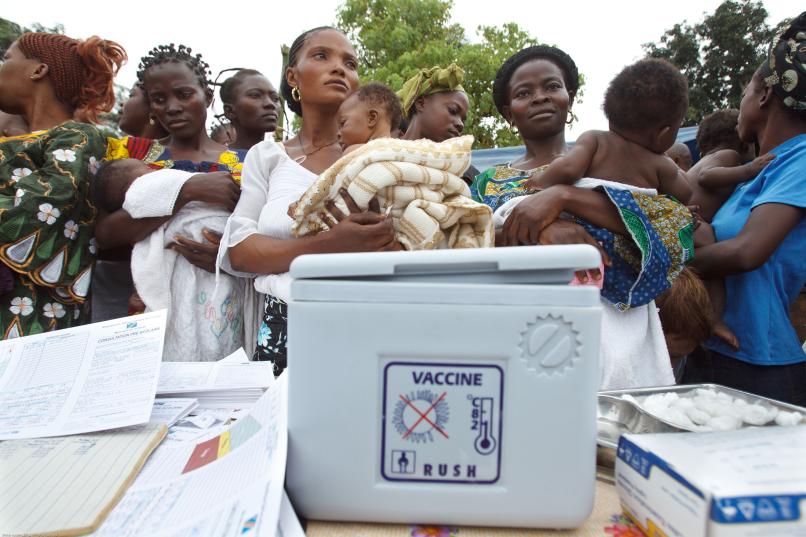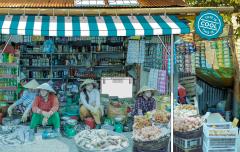How investments and global awareness of sustainable cooling can save lives and empower communities
Sustainable Energy for All’s (SEforALL) Chilling Prospects analysis highlights a critical opportunity: expanding access to affordable, sustainable cooling solutions can save lives.
Around the world, soaring temperatures aren't just a summer bummer; they can be dangerous for outdoor workers, expectant women, older adults, and those battling health issues like heart diseases and diabetes. This is especially important as heatwave deaths have tragically risen, with estimates reaching 356,000 in 2019.
Heat tolerance isn't one-size-fits-all
New findings from a seven-year study in India sheds light on a worrying trend: working in scorching temperatures can more than double the risk of miscarriage or still or premature birth for expecting mothers. This research highlights the importance of keeping cool during pregnancy, especially for those in informal workplaces or with physically demanding jobs.
Eight hundred pregnant women in Tamil Nadu participated in the study led by SRIHER's Faculty of Public Health in Chennai. Half the participants had jobs with high heat exposure, such as working in agriculture, brick kilns, or salt flats. The others worked in cooler settings like schools and hospitals, though even some of these faced periods of high heat.
Further, a 2022 study by Lancet Countdown on Health and Climate Change shows that heat stress caused labour-related losses equivalent to roughly 4% of Africa’s Gross Domestic Product (GDP), primarily impacting the agricultural sector. In the same year, labour-related losses due to heat stress in Europe and North America stood at 0.1% and 0.2% despite increased heatwaves in the region, highlighting the disparity in the economic costs of climate change for developing countries.
Bridging the divide
There are several sustainable cooling solutions that can provide support for vulnerable workers, including pregnant women in the agricultural sector, at a low cost:
- For agricultural workers, shade, access to water, adapting working hours to cooler parts of the day, and having a plan in the workplace to identify and treat heat stress are essential measures to ensure health and safety in high-temperature conditions.
- In buildings, cool roofs, vegetation, water fountains, ventilation, and fans can make working environments more productive and reduce the risk of heat stress by maintaining lower indoor temperatures and improving air circulation.
- Cities and neighbourhoods can team up with businesses to develop local plans to protect people from high temperatures, include training on treating heat stress, early warning systems, and designating communal cooling areas like schools, libraries, and community centres to provide relief during extreme heat events.
- Nature can play a crucial role in cooling cities by integrating green infrastructure into urban planning. Planting trees and creating green spaces, such as parks and urban gardens, can significantly reduce temperatures through shading and evapotranspiration. Green roofs and walls not only lower building temperatures but also improve air quality and biodiversity.
Taking action
SEforALL is at the forefront of tackling the global challenge of cooling access through a multifaceted approach that supports governments and the private sector to expand access to sustainable cooling, leveraging data from our Chilling Prospects series with awareness campaigns like the #ThisisCool campaign and the Cooling Solutions Directory.
SEforALL is working in Kenya to drive the implementation of the National Cooling Action Plan and in Madagascar to support more effective strategies for vaccine and agricultural cold chains.
We’re also championing the next generation of innovators through the "This Is Cool Challenge," which provides funding, visibility, and networking opportunities for young minds developing sustainable cooling solutions.
SEforALL and its partners recognize that the access to cooling challenge requires a multi-pronged approach that includes innovation to develop affordable and energy-efficient cooling technologies, implementing policy frameworks that support sustainable cooling solutions, enhancing financial mechanisms to support these initiatives, and raising awareness about the importance of equitable access to cooling for vulnerable populations.
“In Kenya, the National Cooling Action Plan was launched in 2023 to address the growing demand for cooling while minimizing environmental impact. This plan aims to make sustainable cooling solutions accessible to all Kenyans through the promotion of energy-efficient appliances and eco-friendly refrigerants, improving cold chain infrastructure for food, medicine, and encouraging smart building design that reduces reliance on active cooling,” said Elizabeth Wangeci Chege, Energy Efficiency and Cooling Specialist at Sustainable Energy for All.
“Policies such as Minimum Energy Performance Standards (MEPS) and Higher Efficiency Standards (HEPS) can significantly reduce energy use from air conditioners by incentivizing the uptake of energy-efficient cooling,” added Elizabeth.
SEforALL is also supporting the private sector in Kenya to help mobilize finance for affordable and sustainable cooling solutions and supporting County governments in Kenya to build capacity to address the impacts of extreme heat locally.
The new data highlighting the risks of extreme heat to pregnant women is one of a growing number of ‘wake up calls’ that the impacts of heat are more serious for vulnerable people than previously anticipated. Addressing them first requires recognizing these impacts and their economic effects, and cooperation between community leaders, civil society, the private sector and national governments to implement solutions that protect people and economic development.
Join the Movement: The Chilling Prospects Series identifies and tracks gaps in access to cooling, calling for progressive and inclusive action towards a just transition. To learn more, browse our Cooling Solutions directory and try our Cooling for All solutions tool here: #ThisIsCool.

